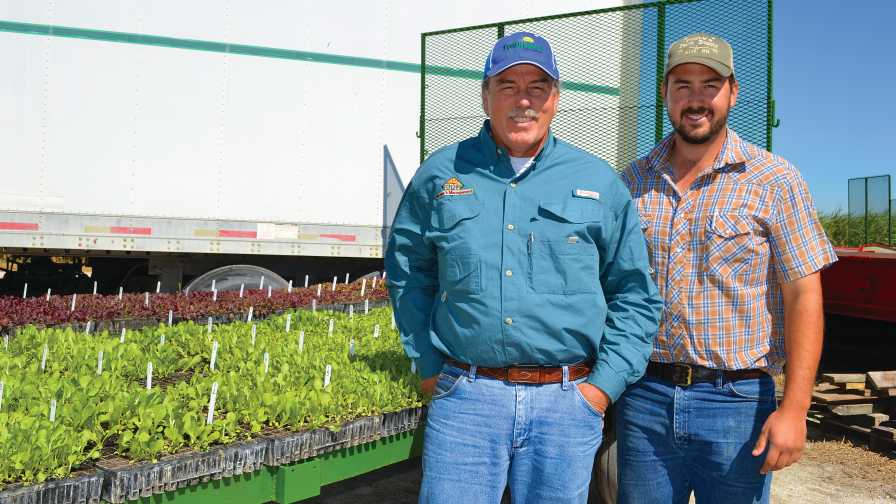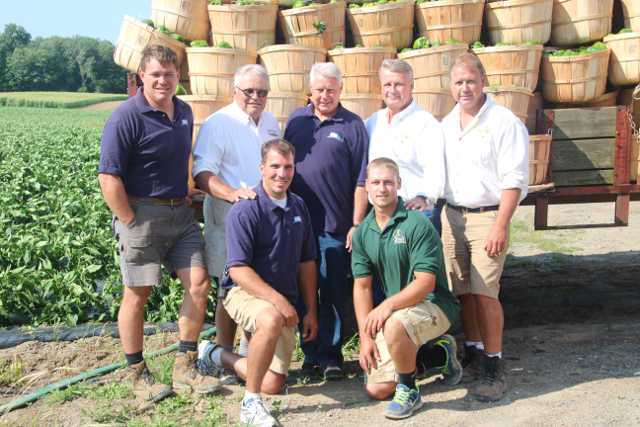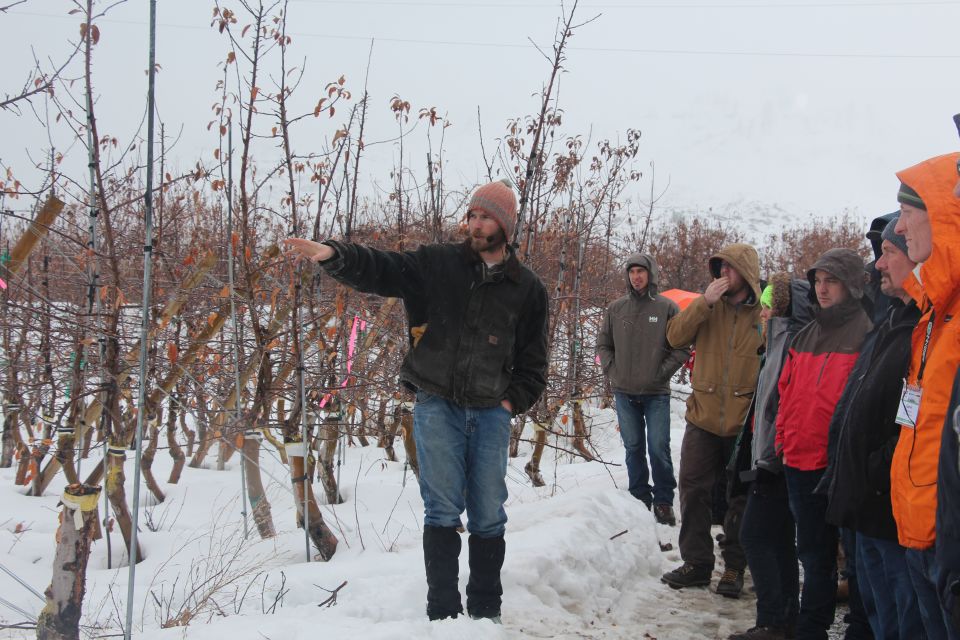Advice for Taking Over the Family Farm

Derek Orsenigo [right] has learned much from his father Paul, helping to ensure future success for their family farm.
Photo by Frank Giles
Start Early
Jake Robison is a fourth-generation fruit grower in Chelan, WA, and the most important thing he says families need to understand is transitions take time. “You need to get started 10 years in advance,” he says. “We started two years ago, and the transition will be complete seven years from now.”
For fifth-generation grower Evan Zittel of Amos Zittel & Sons in Eden, NY, his interest in coming back actually started much earlier. He acknowledges his return to the family farm was not as challenging as one might expect because he’s not the first Zittel to go through an ownership transition.
“I started the conversation with my family around sophomore or junior year of high school,” he says. “I have been working on the farm with my family since I could walk and I am not the first family member to go through the transition, [so] I was able to understand what the transition entailed and what was expected of all owners of my family’s business.”
The first step, says Derek Orsenigo with Growers Management Inc., in LaBelle, FL, starts before discussing transitions: You should first verbalize your intentions to your family. “It just starts with being open and communicating your intentions,” he says.
“You have to be ‘all in.’ So, if you are passionate and focused on where you want to go and what you want to be, then it all starts with expressing your desires to be part of the business for the long term.”

The Zittel family farms more than 300 acres of a variety of vegetable crops in New York. Pictured in the back row (L-R) are Mark, Paul, George, Bill, and Dave Zittel. In front are Kevin (left) and Evan Zittel.
Photo credit: Kristen Zittel Winiecki
Get Outside Help
Robison says he and his father sought the help of an outside consultant. They used their local Farm Credit branch to help understand the technical nature of the transition. A moderator can help both parties come to an understanding. “It helps to have someone from the outside [assist] to make sure it is not too intense.”
Robison also has three siblings that are not involved in the farming operations and the conversations were awkward and complex, he says, but necessary. “They have equal rights to this stuff. It’s an inheritance,” he says. “The door is open for them to come back.”
Having a moderator helped the family develop private sale terms. Robison says this setup was created so the terms were realistic for both parties.
Be Clear With Goals
Robison acknowledges each farm and farm family will be different, and the transition is very personal in nature. That’s why it’s vital to establish goals for the transition that are specific to your farm and your operation.
For his family, the goals were “take care of the older generation and if they want a retirement, see how that can happen. We wanted to maintain a good family relationship, especially with those siblings not involved in the transition,” he said. And lastly, “the business needed to continue to profit through the transition.”
While It’s Personal, It Is a Business
As you consider working with family, Zittel says it’s vital that you have a good relationship with those people with whom you’ll be working with.
“You need to be able to work well with your family. That can be the biggest downfall of most family businesses, the lack of good communication and respect toward one another,” he says. “This is a business and your family is your business partner, but never forget that they are family first and open communication with constructive criticism is important.”
Coming back to your family farm is a personal decision, and one the generations before you worked hard to develop and grow. And while there is a personal side to your operations — because you’re working with family — it’s vital to keep the personal side out of the decision. “We’re trying to view this as a business,” Robison says.
Orsenigo says his family sits down throughout the year to review how the business is going and how the transition will continue to take course for the future. “You must be fully vested for what is in the best interest of the entity,” Orsenigo says. “Everyone has to be on the same page and focused on the task or goal at hand to advance the business.”

During a field tour, Jake Robison explains how his family decided to topwork some trees to ‘Jazz’ on M.26 to increase the profitability of that block before a complete replant in a few years. Photo by Christina Herrick
Learn From the Generations Before You
While you might have your own opinions on how to run your family’s business once you take over, Zittel, Robison and Orsenigo say it is important to learn from the previous owners as to how and why decisions are made the way they are.
Robison says he’s been involved with the numbers side of the operation to learn how his father makes decisions. His father also used him as a general manager, and often asked him how he would make a decision in a particular situation.
“He would say ‘You tell me what you think we should do,’” he says. “He’s the boss, and I know that. I’m his manager. Be honest and transparent [with each other] and he let me make mistakes and learn how he makes decisions.”
Zittel says it’s also good to seek out the insight from others – not just family – as you’re starting to transition into a position of ownership, an outside perspective can help you see where the operation needs to head in the future.
“Don’t be afraid to ask other farmers, researchers, or professors about growing, harvesting or any other questions that can pertain to your farm,” he says.
Orsenigo says learning from his father has been a vital step in taking over operations.
“I have been fortunate to have my Dad as a great teacher and leader. He has exposed me to a multitude of experiences during my time with the business that will be very beneficial to me in the future,” he says. “It takes several years to fully grasp and understand the depth of the operation, from the farming/in-the-field side of things, to the day-to-day office/business function.”
He also says it’s important to soak up the knowledge from the elder generations on your operation. Your family farm is in the position it is thanks to the hard work from the generations before you.
“The ones that came before you (father/grandfather) got to where they are for a reason. Learn from their focus and diligence. Value their advice and experience,” he says.
It Takes Trust and Time
“There is no written contract. I’m trusting my dad a lot,” Robison says. “There are no stipulations, which leaves the door open. I’m not even tied to buy [the farm], but I have the first right of refusal.”
He says without a written contract, the door also is open for his siblings to come back, acknowledging seven years from now — when the transition will be complete — is a long time and a lot can change. However, there is a cutoff point for those siblings who aren’t involved now to decide to come back.
Zittel says it’s also important to understand that ideas that you may want to adopt need to be introduced gradually.
“During the transition period, in most circumstances, your family will not be willing to completely change their entire operation to what you believe will work best,” he says. “You need to slowly implement your ideas and show them that it will work more efficiently or create better profit.”
Orsenigo says, above all, understand that transitions take time, and have patience. “These transitions don’t happen overnight,” he says. “There is a lot to learn and consider in order to continue the business’ stability and success going forward.”










